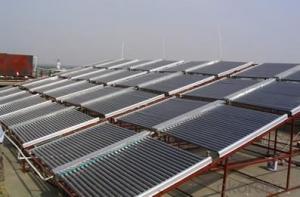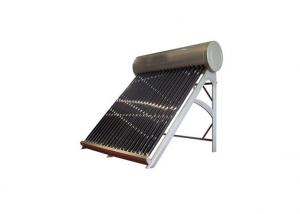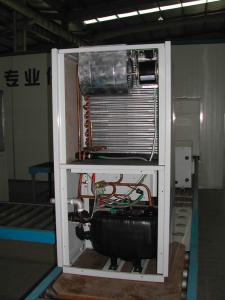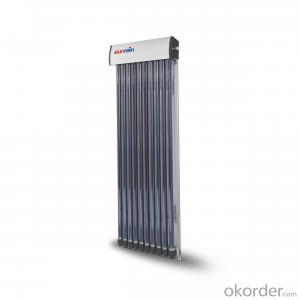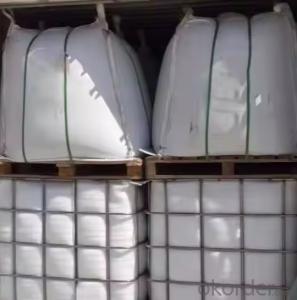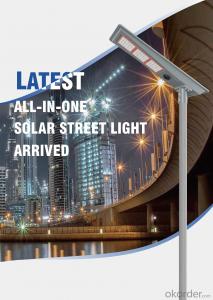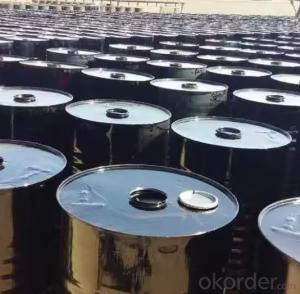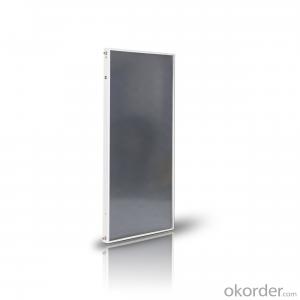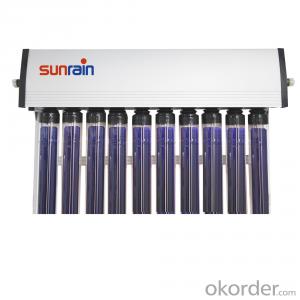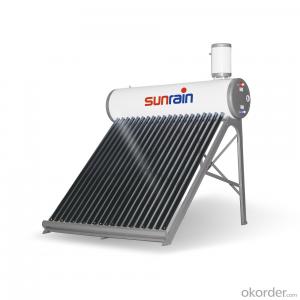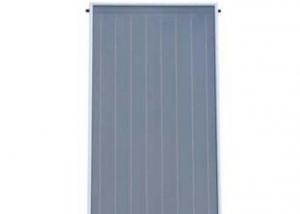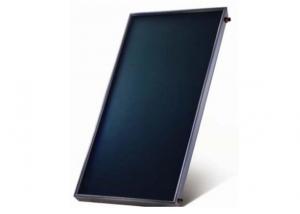Stainless Steel Solar Water Heaters Competitve Price
- Loading Port:
- China main port
- Payment Terms:
- TT OR LC
- Min Order Qty:
- 10 set
- Supply Capability:
- 1000 set/month
OKorder Service Pledge
OKorder Financial Service
You Might Also Like
Working Principle of Domestic Solar Water Heaters:
Solar energy, in essence, is an electromagnetic wave, a type of strong optical radiation, which is produced by thermonuclear fusion reaction. The energy of the solar radiation is transmitted through the liught of different wave length. The solar water heater is designed to mainly take in the energy of visible light & near ultra red light through the selective absorbing coating of vacuum tubes.When the water in the solar collector is heated by the solar radiation, its temperature rises. As a result, the water in the solar collector and the water in the tank form natural convection because of density contrast casued by the temperature difference. So the water of the higher temperature is incessantly forced into the insulated solar water tank( As shown in the figure).
Features
<1> Imported SUS304-2B food-level stainless steel,thickness:0.31~0.5mm
<2> Outer tank: High quality stainless steel,thickness:0.31~0.5mm
<3>Insulation: 50~55mm polyurethane foam
<4> Vacuum tube: CU/SS-AL/N red tube
<5> Frame: Stainless steel/Aluminum alloy,thickness:1.2~2mm
<6> Reflector: Stainless steel/Aluminum alloy as option
<7> Available accessories: Feeding tank,solar controller,electric heater, Mag rod,thermostatic mixing valve
Specification
ITEM.NO | SPECIFICATION | EFFECTIVE LIGHT AREA | TANK'S CAPACITY | APPLICATION PEOPLE | CBM | |||
DIAMETER OF WATER TANK | QTY OF TUBE(pcs) | DIAMETER OF TUBE | LENGTH OF TUBE | |||||
Z-NS5810 | 460mm | 10 | 58mm | 1.8m | 1.04 | 100L | 4 | 0.37 |
Z-NS5812 | 460mm | 12 | 58mm | 1.8m | 1.25 | 120L | 4-5 | 0.44 |
Z-NS5815 | 460mm | 15 | 58mm | 1.8m | 1.56 | 150L | 6 | 0.56 |
Z-NS5818 | 460mm | 18 | 58mm | 1.8m | 1.87 | 180L | 7-8 | 0.64 |
Z-NS5820 | 460mm | 20 | 58mm | 1.8m | 2.08 | 200L | 8 | 0.7 |
Z-NS5825 | 460mm | 25 | 58mm | 1.8m | 2.61 | 250L | 10 | 0.89 |
Z-NS5830 | 460mm | 30 | 58mm | 1.8m | 3.13 | 300L | 12 | 1 |
Z-NS5836 | 460mm | 36 | 58mm | 1.8m | 3.75 | 360L | 14-15 | 1.3 |
Z-NS5840 | 460mm | 40 | 58mm | 1.8m | 4.17 | 400L | 16 | 1.4 |
Z-NS5845 | 460mm | 45 | 58mm | 1.8m | 4.69 | 450L | 18 | 1.6 |
Product Details Show
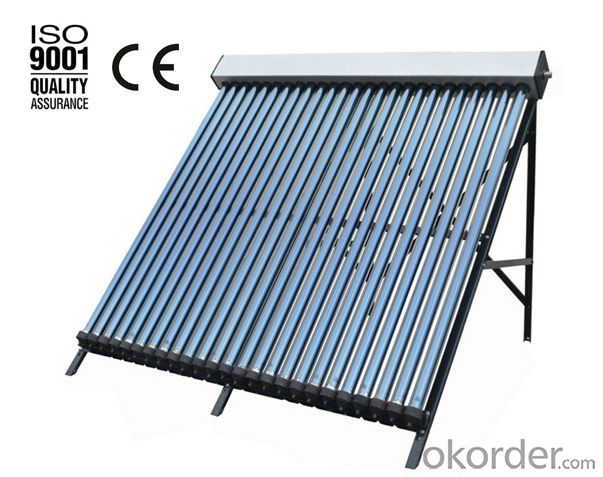
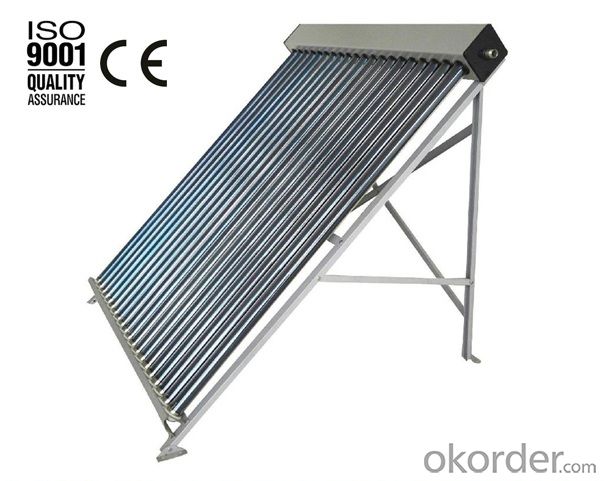
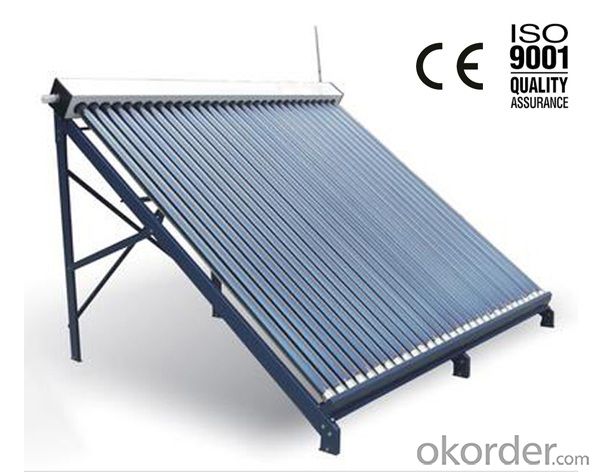
FAQ
1. Q: Are you a factory or trading company?
A: We are a factory. Especially for Solar Controller, PWM solar controller 50A12V/24V
2. Q: Where is your factory located? How can I visit there?
A: Our factory is located in Guangzhou, China. You are warmly welcomed to visit us!
3. Q: what other product you have except such Solar Lighting?
A: We have poly ,mono cells and panels. Off grid solar system, like off grid solar inverter, pure sine wave inverter, solar collector, solar controller, solar charger, Portal solar system, battery, DC Fan, Solar Led Light.
4. Q: Can the price be cheaper?
A: Of course, you will be offered a good discount for big amount.
5. How can I get a sample?
A: Please call us or send email for asking the samples.
- Q:Can a solar water heater be used in areas with restrictions on rooftop installations?
- In areas with restrictions on rooftop installations, a solar water heater can still be utilized. Although rooftop installations are typically the most common and efficient method for harnessing solar energy for water heating, there are other viable options available. One possibility is to install the solar water heater on the ground, either in the backyard or any suitable open space. To accomplish this, a rack or stand specifically designed for solar water heaters can be used. Another option is to install the solar water heater on a wall or a freestanding structure, such as a shed or a carport. These alternative installations may necessitate additional equipment and adjustments, but they can effectively utilize solar energy to heat water while adhering to any restrictions on rooftop installations. It is crucial to consult with a professional installer to determine the most suitable alternative installation option based on specific restrictions and conditions.
- Q:Are solar water heaters expensive to install?
- Solar water heaters can be initially expensive to install, but they can save money in the long run by reducing energy bills and providing a more sustainable and environmentally friendly heating solution.
- Q:What is a solar water heater?
- A solar water heater is a device that uses energy from the sun to heat water for domestic or industrial use. It typically consists of solar collectors, which absorb sunlight and convert it into heat, and a storage tank to store the heated water. This renewable energy solution helps to reduce the reliance on traditional fossil fuel-based heating systems, leading to cost savings and decreased environmental impact.
- Q:What is the difference between passive and active solar water heaters?
- Passive and active solar water heaters are two distinct types of systems employed for utilizing solar energy in heating water. Their dissimilarities primarily lie in their mechanism and complexity level. Passive solar water heaters depend on natural convection and gravity for the circulation of water within the system. Typically, they comprise a storage tank positioned above the solar collectors, which absorb sunlight and warm the water. As the hot water rises, it effortlessly moves into the storage tank, while colder water replaces it at the bottom of the collectors. Due to the absence of mechanical pumps or controls, passive systems are simpler and generally more cost-effective to install and maintain. However, their efficiency may be comparatively lower than active systems, especially in regions with limited sunlight or during colder climatic conditions. On the contrary, active solar water heaters make use of pumps or other mechanical devices to circulate water between the solar collectors and the storage tank. These systems are more intricate and necessitate additional components like sensors, controllers, and pumps to regulate water flow and optimize heat transfer. Active systems are usually more efficient and capable of providing a greater amount of hot water, rendering them suitable for larger households or commercial applications. Nonetheless, they generally entail higher installation and maintenance costs due to the added equipment and energy requirements. To summarize, the primary distinction between passive and active solar water heaters lies in the complexity level and the requirement for mechanical components. Passive systems rely on natural convection, whereas active systems employ pumps and controls for water circulation. Passive systems are simpler and more cost-effective, although they may exhibit lower efficiency, while active systems are more complex, efficient, and suitable for larger-scale applications. The choice between the two depends on factors such as budget, available sunlight, and hot water demand.
- Q:What is the quality standard for solar water heaters, to the vast number of consumers a clear standard for reference
- You can look at several aspects:1 vacuum tube, which is the core of solar energy, the vacuum tube is not good, the solar energy can not reach a certain temperature, the use of summer does not matter, but in winter there is no way to use.Some ultra low-cost solar water heater using the vacuum tube has the following defects: low vacuum, only high-quality products 1/100; a large number of impurities and residual water vapor pipe, a high temperatures encountered into gas, vacuum reduction; low vacuum film stability of two or three years, intimal layer aging, fall off, resulting in the thermal performance decays rapidly, unable to absorb enough heat.
- Q:Home decoration, solar not how to switch off the water? Water from the rooftop pool attracted
- Turn off the water.The utility model relates to a solar water heater, which is a device for converting solar energy into heat energy, which is used for heating water from low temperature to high temperature, so as to meet the requirement of hot water use in people's life and production. According to the structure of the solar water heater is divided into vacuum tube solar water heater and flat type solar water heater, mainly vacuum tube solar water heater, occupy 95% of the domestic market share. Vacuum tube type solar water heater is composed of a heat collecting pipe, a water storage tank and bracket and other related parts, converting solar energy into heat energy mainly rely on vacuum tube, vacuum tube using the principle of cold water sinking floating, the water circulation and desired hot water.
- Q:Are there any financial incentives for installing a solar water heater?
- Yes, there are several financial incentives for installing a solar water heater. These incentives can include federal tax credits, state and local rebates, and utility company incentives. Additionally, installing a solar water heater can significantly reduce energy bills, leading to long-term savings on utility costs.
- Q:Can a solar water heater be used in areas with limited access to water treatment facilities?
- Yes, a solar water heater can be used in areas with limited access to water treatment facilities. Solar water heaters rely on the sun's energy to heat water, making them independent of water treatment facilities. They can be installed in remote areas where clean water may not be readily available, providing a sustainable and cost-effective solution for heating water without relying on traditional treatment methods.
- Q:Can a solar water heater be used in areas with limited access to building codes and regulations?
- Yes, a solar water heater can be used in areas with limited access to building codes and regulations. Solar water heaters are relatively simple systems that can be installed without extensive building permits or regulations. As long as the installation is done safely and following basic guidelines, it can be a viable option for areas with limited building codes and regulations. However, it is always recommended to consult with professionals and ensure that any necessary safety measures are taken into account.
- Q:Can a solar water heater be used in areas with high levels of air pollution from agricultural activities?
- Yes, a solar water heater can still be used in areas with high levels of air pollution from agricultural activities. The efficiency of the solar water heater may be slightly affected due to the reduced sunlight reaching the solar panels, but it can still provide hot water by harnessing the available solar energy. Regular maintenance and cleaning of the solar panels may be required to ensure optimal performance in such polluted areas.
1. Manufacturer Overview |
|
|---|---|
| Location | |
| Year Established | |
| Annual Output Value | |
| Main Markets | |
| Company Certifications | |
2. Manufacturer Certificates |
|
|---|---|
| a) Certification Name | |
| Range | |
| Reference | |
| Validity Period | |
3. Manufacturer Capability |
|
|---|---|
| a)Trade Capacity | |
| Nearest Port | |
| Export Percentage | |
| No.of Employees in Trade Department | |
| Language Spoken: | |
| b)Factory Information | |
| Factory Size: | |
| No. of Production Lines | |
| Contract Manufacturing | |
| Product Price Range | |
Send your message to us
Stainless Steel Solar Water Heaters Competitve Price
- Loading Port:
- China main port
- Payment Terms:
- TT OR LC
- Min Order Qty:
- 10 set
- Supply Capability:
- 1000 set/month
OKorder Service Pledge
OKorder Financial Service
Similar products
New products
Hot products
Hot Searches
Related keywords
